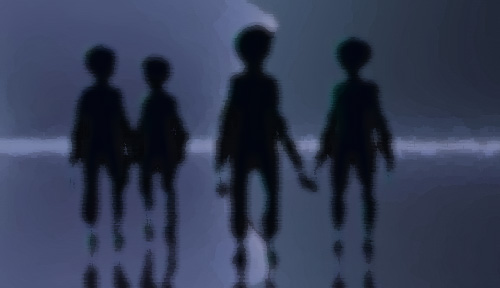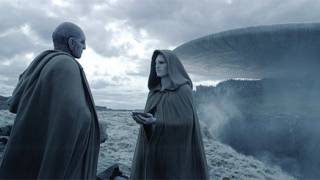Growing up alien
Source: aeon.co

My younger brother and I called him ‘the old lizard’ (on account of his reptilian resemblance — and to irk our mother, his partner at the time). To his enemies, he was a crackpot, fraud, and a cheat. And to his patients, and many of his friends, he was a source of support, an open listener, a sage and protector.
 Dr John E Mack was many things to many people. A Harvard-trained psychiatrist, tenured professor, and one of the founders of the Cambridge Hospital Department of Psychiatry (a teaching hospital affiliated with Harvard University), John held an impressive command and was respected in his field. After an early career spent working on issues of child development and identity formation, he won the Pulitzer Prize in 1977 for his psychoanalytic biography of Lawrence of Arabia, entitled A Prince of Our Disorder (1976). Then, in the late 1980s, John put his reputation on the line when he started investigating the phenomenon of alien abduction.
Dr John E Mack was many things to many people. A Harvard-trained psychiatrist, tenured professor, and one of the founders of the Cambridge Hospital Department of Psychiatry (a teaching hospital affiliated with Harvard University), John held an impressive command and was respected in his field. After an early career spent working on issues of child development and identity formation, he won the Pulitzer Prize in 1977 for his psychoanalytic biography of Lawrence of Arabia, entitled A Prince of Our Disorder (1976). Then, in the late 1980s, John put his reputation on the line when he started investigating the phenomenon of alien abduction.It all started innocently enough. He began holding sessions with patients or ‘experiencers’ (as they’re called) who believed they’d been abducted. He ran hypnotic regressions from our home, and he gradually came to furnish enough evidence for a book, Abduction: Human Encounters with Aliens (1994). This was followed in 1999 by Passport to the Cosmos: Human Transformation and Alien Encounters. His standard line with the outside world was (as given to the BBC): ‘I would never say, yes, there are aliens taking people. [But] I would say there is a compelling powerful phenomenon here that I can’t account for in any other way, that’s mysterious… I can’t know what it is but it seems to me that it invites a deeper, further inquiry.’
In the privacy of our home, where he was a regular presence, John was bolder in his claims. Aliens were real — it was just that their existence threatened the dominant logic of our worldview. John attributed society’s failure to account for the abduction experience as a cultural failing. Alien abductees weren’t deranged or mentally ill — we just didn’t have a way of interpreting and understanding what they’d been through. Rather than label these peoples’ experiences as a new disorder or syndrome, John argued that we had to probe into and change our perception of reality to account for this phenomena. The subtext: we had to allow for the existence of aliens.
For more than a decade, from the time I was eight until I was of legal age, I was witness to these debates and to the politics surrounding John’s ‘coming out’ in support of abduction phenomena. My mother, an anthropologist by training, was John’s primary research assistant. They bought a house together in Cambridge, Massachusetts and my brother and I visited them once a month and during school holidays. The rest of the time we lived with my father and stepmother in Arlington, Virginia.
Like many of his colleagues, I viewed John with a mixture of scepticism and intrigue. Part of my scepticism can be put down to the fact that he was dating my mom; but a good fraction of it owed to my sense of reality being overturned by the postulation of ‘greys’ — a particular manifestation of extraterrestrials, known for their large heads, huge almond eyes, and shortened, pretty much featureless bodies.
At eight, and still learning to distinguish between fantasy and reality, the imposition of adults who believed in aliens was confusing and anxiety-provoking, but adventurous and thrilling too. I was fairly sure that Santa Claus wasn’t real. But I wouldn’t have bet my life on it. My stuffed animals and toys had only just lost that animistic quality — becoming mere playthings, instruments of the imagination, as opposed to real creatures with essences all their own. As for aliens, I couldn’t be sure. Flying on airplanes between my parents’ houses I’d sometimes be on the lookout for a hovering metallic orb.
It was 1992 when John entered our lives. Bill Clinton was president, and Kurt Cobain dominated the airwaves. It was the end of the Cold War stand-off, and the political scientist Francis Fukuyama had just published his book The End of History and the Last Man, where he wishfully predicted that human evolution had come to an end with the triumph of Western liberal democracy. Everything was smooth sailing. We no longer had the threat of communists, but we didn’t yet have the threat of terrorists. In need of a symbolic enemy, aliens personified an important ‘other’ — a dystopian warning to our Western culture’s all too eager triumphalism.
On television, the paranormal soon paraded around on shows such as Roswell and The X-Files, which explored extraterrestrial phenomena in the shadow of government cover-ups and conspiracy. Flip channels and you might have caught Arthur C Clarke’s equally other-worldly 26-part series Mysterious Universe . It’s no wonder that the 1990s saw a rush of alien appearances in the popular imagination. The impending millennium brought with it the arrival of a future that had always been distant. As the political scientist Jodi Dean, author of Aliens in America (1998), articulated at the time, the appearance of aliens corresponds to our ‘anxieties over technological development and our growing consciousness of ourselves as a planet and our fears for the future at the millennium’.
There is some truth here. When I asked my mom and John growing up what the aliens intended (subtext: ‘Do they come in peace or should I be really scared?’), they said that many experience’s felt that aliens communicated an environmental message about the urgency of saving the planet.
At the same time, many of the abductees that John interviewed attested to the technological superiority of the alien race. I was told stories about patients who experienced aliens that could pass through walls, were able to communicate with extrasensory perception (ESP) and mind-reading, and perform medical experiments on humans without invasive surgery. In this light, aliens provided an outlet for all our fears of technological domination. To have an experience of aliens was to realise that the human race might not represent the pinnacle of evolution, that we were perhaps inferior to extraterrestrial life.
But as a kid largely ignorant of grander sociological forces, aliens were only one thing: scary. They had large black eyes and androgynous forms. And they were real — like ghosts and witches and monsters. In daylight, I was sceptical (the good little rationalist), but night-time brought with it a tide of magical thinking. I used to lie in bed and worry that maybe I would be abducted. I would even make supplicating promises of better behaviour in the hope of bartering with these outsiders — ‘I’ll be good, just leave me alone.’ In my secular progressive household, aliens offered a moral disciplining authority, an invisible spectator to police my actions.
After many years elapsed without any sign of extraterrestrial visitation, I began to feel ignored. My fears turned to pangs of dejection: ‘Wasn’t I special?’ ‘Shouldn’t I be a chosen ambassador for the human race?’ Or even: ‘If the aliens were really out to create a master race (as I overheard), didn’t they want my DNA?’
[...]
Read the full article at: aeon.co
Tune into Red Ice Radio:
Dr. David M. Jacobs - Abductions & The Human Alien Hybrid Program
Chris Augustin - UFO Sightings, Alien Abductions & Mysterious Implants
Bob Dean - NATO’s "Assessment" of Alien Life & The Impact of Disclosure
Kevin Randle - UFO Crashes, Sightings, The Roswell Incident & Majestic 12 Documents
Lynn Marzulli - The Alien Interviews
Tom Montalk - Alien Agendas, The Physics of Reality & Etheric Energy
Nigel Kerner - Grey Aliens and the Harvesting of Souls, Genetic Engineering, Bloodlines, Races & DNA






















